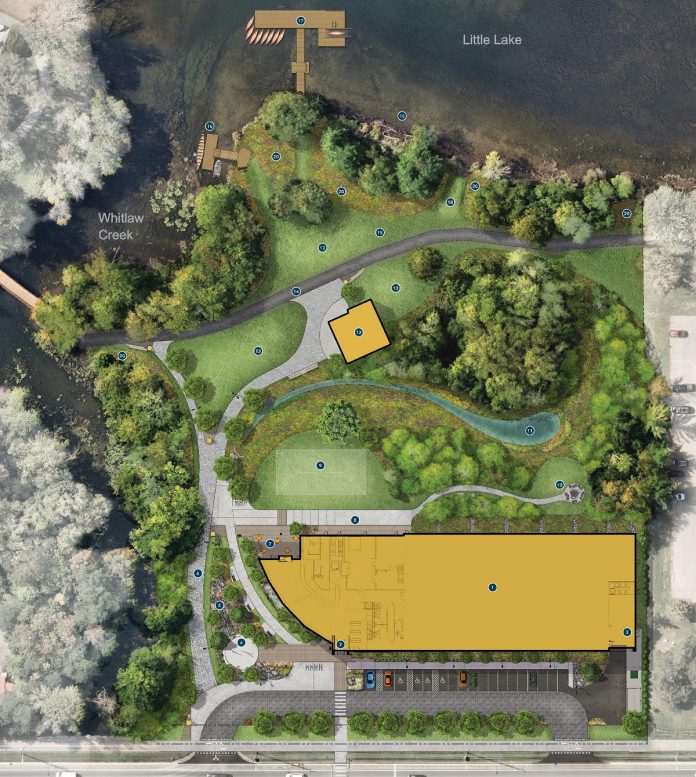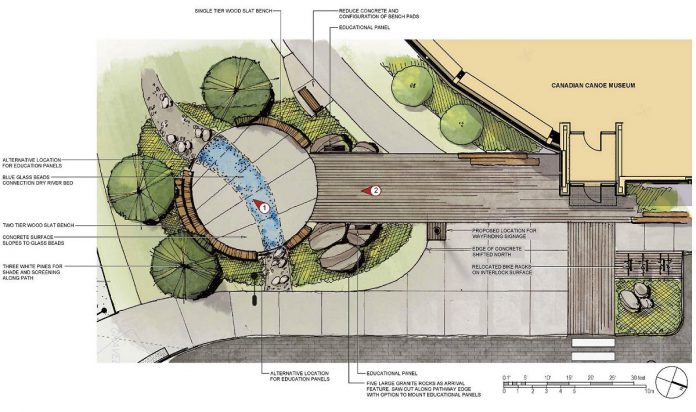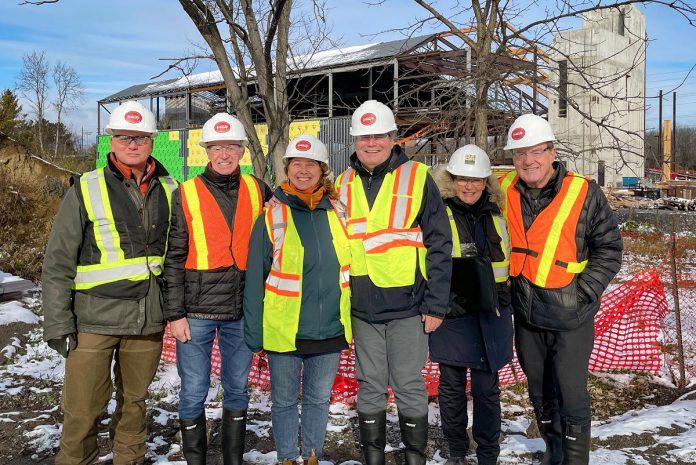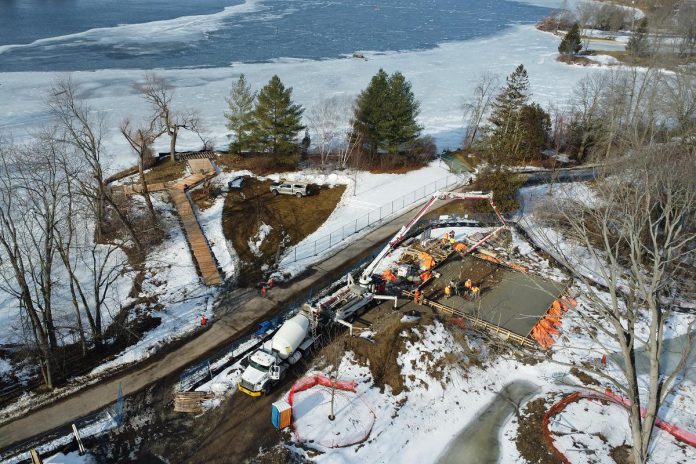
Peterborough’s Canadian Canoe Museum has announced plans for a community-oriented waterfront campus along the shore of Little Lake near the museum’s new location, thanks to a $1,775,000 gift from former CFL player and businessman Stuart “Stu” Lang and his wife Kim.
The new 65,000-square-foot museum, currently under construction at 2077 Ashburnham Drive, will include an adjacent 5.3-acre redeveloped waterfront campus featuring 1,200 feet of shoreline with docks, a boardwalk, and restored and naturalized spaces including a wetland.
“We are incredibly grateful and fortunate for the passion, vision, and generosity of the Langs,” says the museum’s executive director Carolyn Hyslop. “Stu has taken great pride in helping craft an active waterfront that can complement the museum, with many of the ideas for the lakefront campus coming from Stu himself. This gift, confirmed in the fall of 2022, has grown to the transformative gift it is today because of the Langs’ commitment to excellence and elevating The Canadian Canoe Museum to a national level.”
A new offering that was unavailable at the museum’s former land-locked Monaghan Road location, the lakefront campus allows the museum to offer visitors a fully integrated experience, from learning about the canoe to stepping out of the museum and, within a minute’s walk, enjoy paddling around Little Lake.
The redeveloped waterfront will include an accessible all-season boardwalk connecting the museum to the Little Lake shoreline and to the Trans Canada Trail, which runs through the property between Roger’s Cove to Beavermead Park.
The lakefront campus will provide museum visitors with opportunities to get out on the water with a walk-in canoe launch, two seasonal canoe docks, and an adaptive canoe and kayak launch station. The docks and the nearby Canoe House will allow the museum to host voyageur canoe tours, adult and youth paddling programs, certification courses, regattas, and canoe and kayak rentals for the public.


“The lakefront campus will make our museum come alive,” Hyslop says. “Participants in a paddle carving or canoe restoration workshop will experience the excitement of testing their freshly honed skills on the water. Schoolchildren and campers will get their hands dirty while exploring the biodiversity of the wetland or learning to build a campfire.”
“Seating and signage throughout the site will encourage visitors and trail users to take in the expansive views of Little Lake before or after visiting the galleries. And the docks, canoe racks, and a connection to the Trans Canada Trail will encourage community connectivity and active, accessible transportation.”
The Langs’ donation will also support a gathering circle outside the museum’s main entrance that will welcome visitors arriving by car, bus, bicycle, or on foot. Inspired by Canadian canoe routes and the water’s impact on the landscape, the gathering circle will feature natural elements that emphasize the relationship between land and water.
With a water infiltration garden, wood slat benches, and a small amphitheatre surrounded by large granite boulders and white pine trees., the gathering circle will offer museum visitors as well as public trail users a space for reflection and education.
“We are so grateful to Stu and Kim Lang for their transformational donation that has led to the creation of the lakefront campus and gathering circle,” Hyslop says. “The Canadian Canoe Museum and the community will feel the impact of this donation for years to come.”
Highly respected members of the Guelph community with a lengthy record of philanthropic giving, the Langs have donated millions of dollars to numerous causes related to athletics, academics, and animal welfare. They donated over $70 million to Queen’s University and the University of Guelph, supporting both student athletes and the general student populations.

The University of Guelph’s S. Lang School of Business and Economics was named after Stu’s father following a $21-million gift, the largest ever in the school’s history. The Langs have also contributed to the Ontario Veterinary College, the Guelph Humane Society, and Guelph General Hospital, and also established the Angel Gabriel Foundation, a registered charity.
Prior to joining CCL Industries, the family business where he worked for 25 years before becoming a director of the company, Stu had a successful eight-year professional football career with the Edmonton Elks in the Canadian Football League, with his team winning five Grey Cups.
Both Stu and Kim have a passion for camping and canoe tripping, having attended the Taylor Statten Camps in Algonquin Park. At these camps, they both developed a life-long enthusiasm and interest in canoeing, the outdoors, and educating youth about Canadian history.
“The Canadian Canoe Museum’s world-class collection deserves an outstanding home,” Stu says. “A fully realized lakefront campus and gathering circle are essential. They will showcase the canoe’s incredible history and cultural significance and connect people to the land and water in a way that only hands-on experiences can.”
“The new museum will be a place where people can come together, learn by doing, and be inspired by the stories and traditions of the canoe. It’s an investment in our past, present, and future, and we are proud to be a part of it.”
The $40 million cost of the new museum is being funded by donors across the country, including significant donors such as the Langs and the Weston Family Foundation, as well as by all levels of government.

The federal government through the Department of Canadian Heritage and the Federal Economic Development Agency for Southern Ontario (FedDev Ontario), the City of Peterborough, Peterborough County, and the Ontario government have also contributed funding for the new Canadian Canoe Museum.
The new museum’s originally scheduled opening date of early summer has been delayed due to labour and supply shortages. The new museum is now expected to open in late summer or early fall.
For more information about the new museum or to sign-up for updates, visit the museum’s website at www.canoemuseum.ca.



























